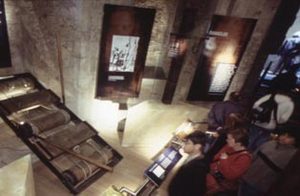
|
Remember, remember the fifth of November,The fireworks are sounding at Russell Square, near where I sit, and across the land bonfires are being lit. On November 5, Britain remembers Guy Fawkes and the Gunpowder Plot. Fawkes, an ensign, had taken the lead in a 1605 plot to blow up the houses of Parliament at Westminster as part of a Catholic effort to bring down the Protestant monarchy in England. He was apprehended - allegedly in the act itself - taken to the Tower, and subjected to torture. For centuries, Guy Fawkes Day marked the event. Englishmen were taught of the need to be vigilant in the defense of the realm, and particularly to remember the threat from within, from the disloyal Catholics. But mostly they enjoyed the privilege of lighting bonfires and engaging in pranks on a chilly autumn evening.
The gunpowder, treason and plot,
I know of no reason
Why gunpowder treason
Should ever be forgot
Guy Fawkes, Guy Fawkes, 'twas his intent
To blow up the King and Parliament.
Three score barrels of powder below,
Poor old England to overthrow;
By God's providence he was catch'd
With a dark lantern and burning match.
Holloa boys, holloa boys, make the bells ring.
Holloa boys, holloa boys, God save the King!
Hip hip hoorah!
A penny loaf to feed the Pope.
A farthing o' cheese to choke him.
A pint of beer to rinse it down.
A faggot of sticks to burn him.
Burn him in a tub of tar.
Burn him like a blazing star.
Burn his body from his head.
Then we'll say ol' Pope is dead.
Hip hip hoorah!
Hip hip hoorah hoorah!
But today Britons have a take on Guy Fawkes that is much at odds with the historical one. Once Fawkes was a symbol of the traitor within. The people were called to be on guard against his like. No longer. Today Guy Fawkes is increasingly viewed as the heroic figure prepared to stand against an unjust and oppressive state, as a martyr and a victim of torture. What are the lessons of Guy Fawkes Day for 2007? I propose three:
1. Torture Never Works and is Always Wrong
As set out in The King's Book, King James I's personal account of the Gunpowder Plot, Guy Fawkes was seized and taken to the Tower of London. There, under special warrant issued by the king, he was subjected to torture over the next four days. ("No new torture was to be used," the king directed. The torture was to be mild at first, and then progressively more painful.) The purpose of the torture was first to secure the voluntary confession by Fawkes of his participation in the plot, and second to learn the identities of others who participated with him. Sir William Wade, Lieutenant of the Tower of London at this time, supervised the torture. For three or four days Fawkes said nothing, let alone divulged the names of his co-conspirators. Only when Fawkes learned that some of the conspirators had themselves confessed or that they were dead did he admit their names. The torture therefore failed to secure any information beyond that which was already known. On the last day of January, Fawkes and a number of others implicated in the conspiracy were tried in Westminster Hall. After being found guilty, they were taken to Old Palace Yard in Westminster and St Paul's Yard, where they were hanged, drawn, and quartered. Fawkes, however, managed to avoid the worst of this execution by jumping from the scaffold where he was supposed to be hanged, breaking his neck before he could be drawn and quartered.

|
| In the Tower of London: implements of torture used on Guy Fawkes |
What was the result of the use of torture? It wasn't necessary to secure his conviction in the first place. Fawkes was caught in the act, with innumerable witnesses. No useful information was gained by it. The king, for having authorized its use, was viewed by many of his own subjects as a cruel tyrant. The conspirators, for the cruelty of their treatment, were accepted by many of their co-religionists as martyrs.
Torture was a weakness, not a strength of the government. In twenty-three years, this would be the accepted wisdom of a society sickened and revolted by the official use of cruelty and of torture. In one hundred and seventy years, a nation would be born committed to suppressing it forever . . . or, as it turns out, until the arrival of George W. Bush.
2. Beware the Government that Rules By Fear
A government that uses fear as a tool to cling to power is an enemy to its own people. It will use fear to undermine the rights of the people and to aggrandize its power over them. It will promise to protect, and will claim that it will take rights and offer security in exchange. But this is a fool's bargain. A people who will surrender their essential liberties for an illusory measure of security are not worthy of being free. The lesson of Guy Fawkes is this:
It is not the People who should fear the Government, but rather the Government which should fear the People.
And the people standing resolute can make it so. Even in the time of George W. Bush.
3. A Government That Stereotypes Is Unjust
Guy Fawkes most certainly was guilty of the crime of which he was charged and for which he was executed. But a great many other people suffered in the decades that followed merely because of their religious confession. For the most part they were Catholics. Or they had passed some time in Spain, France, or Italy for which they could not account to the government's satisfaction. In those days, you see, the Catholics were what today we call Islamic terrorists, and the terrorist training camps were in Rome and the south of Spain, not in Pakistan and Afghanistan.
And as Guy Fawkes Day dawns, Britons contemplate the legacy of some bad counterterrorism measures. Like the process of profiling terrorists, which cost one young man his life. The Observer notes in its Guy Fawkes Day editorial:
If a known terrorist is poised to detonate a bomb in a crowded public place and armed police have him in their sights, surely they should shoot without hesitation? No British policeman has yet faced that situation. The officers who shot Jean Charles de Menezes in Stockwell in July 2005 did not know who he was. If they thought he was a suicide bomber on his way to commit mass murder, it is because a bungled operation by fellow officers fed them that belief. As a result, an innocent man was killed. A court last week found that no individual in the Metropolitan Police was to blame for that appalling mistake, but the institution as a whole failed in its duty to protect the public.Tony Blair is gone. But his namesake who headed the Metropolitan Police, and who is largely blamed for the official hysteria that produced the extrajudicial execution of Jean Charles de Menezes, the Brazilian electrician who was unfortunately a bit too dark skinned and suspiciously "Muslim looking," lingers on. The only question, says The Times, is when the "other Blair" will leave. And the remaining question is how the police could have been permitted to conduct themselves in this way.
But Britain is different from the United States. On this score, Americans are by-and-large too timid to challenge the Bush Administration's policy of invidious discrimination and lightly dusted-over racism.
But why did Guy Fawkes fall out of favor in America? After all, George W. Bush seems to love the policies that Guy Fawkes Day marks.
The original George W. saw things quite differently. For him, America was involved in a struggle for its liberty, and the commemoration of Guy Fawkes stood for the opposite: government by fear, oppression of a minority, a celebration of arbitrary power. Guy Fawkes Day was the abnegation of the essential values of the Revolution. So the original George W. put it in an order: No more Guy Fawkes Day.
Order in Quarters issued by General George Washington, November 5, 1775:
As the Commander in Chief has been apprized of a design form'd for the observance of that ridiculous and childish custom of burning the Effigy of the pope - He cannot help expressing his surprise that there should be Officers and Soldiers in this army so void of common sense, as not to see the impropriety of such a step at this Juncture; at a Time when we are solliciting, and have really obtain'd, the friendship and alliance of the people of Canada, whom we ought to consider as Brethren embarked in the same Cause. The defence of the general Liberty of America: At such a juncture, and in such Circumstances, to be insulting their Religion, is so monstrous, as not to be suffered or excused; indeed instead of offering the most remote insult, it is our duty to address public thanks to these our Brethren, as to them we are so much indebted for every late happy Success over the common Enemy in Canada.America, it was settled, would mark the old Guy Fawkes Day with a new tradition: the exercise of the democratic franchise. It was to be the day on which the rulers are held accountable to the people.
The Gunpowder Plot and Treason were taken as a justification for the oppression and persecution of Catholics across England for many decades. The Stuart monarchy's religious bigotry grew side by side with its insatiable taste for power. And this led, over time, to the Civil War. The Gunpowder Plot and its trial were the English-speaking world's first experience with counterterrorism. It demonstrated that some policies are foolish, destroy the confidence of the people in their own government, and may even cause an autocrat or two to loose his head. But some people never learn.
This year, let us again remember the tale of Guy Fawkes. The fifth of November is indeed a day to remember. But with time we have a better reason why.



This is a good article. I've never seen a portrait of Guy Fawkes before.
And, yes, let's make the fifth of November a day to remember...